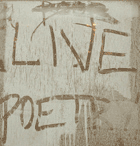(26 April 2005) Here's a poem for a momentous day.
THE UNWRITTEN POEM
by Louis Simpson
You will never write the poem about Italy.
What Socrates said about love
is true of poetry—where is it?
Not in beautiful faces and distant scenery
but the one who writes and loves.
In your life here, on this street
where the houses from the outside
are all alike, and so are the people.
Inside, the furniture is dreadful—
flock on the walls, and huge color television.
To love and write unrequited
is the poet's fate. Here you'll need
all your ardor and ingenuity.
This is the front and these are the heroes—
a life beginning with "Hi!" and ending with "So long!"
You must rise to the sound of the alarm
and march to catch the 6:20—
watch as they ascend the station platform
and, grasping briefcases, pass beyond your gaze
and hurl themselves into the flames.
Today’s Writer’s Almanac notes the following sober anniversary:
It was on this day in 1937 that German bombers attacked and destroyed the city of Guernica in Spain. Hitler was one of the allies of the Fascist side, the side of Franco, in the Spanish Civil War, and he wanted to use the Spanish Civil War as a testing ground for his new blitzkrieg military strategy.
It was a Monday, this day in 1937, a market day in Guernica, farmers were in the town square with their harvest, shoppers filled the street, and that afternoon the German Luftwaffe attacked.
The first wave of planes dropped blast bombs that destroyed the principal buildings; the second wave flew low, gunning down the citizens; and the third wave dropped incendiary bombs to burn any remaining parts of the city. The attack lasted for three and a half hours. When it was over, almost nothing of the city remained. It was the first time in history that a city was completely destroyed from the air.
One of the people who heard the news of the bombing the following day was the painter Pablo Picasso, who was in exile in Paris. He was trying to come up with an idea for a mural to be displayed at the World's Fair in Paris that summer, and when he heard about the bombing, he began a new painting called Guernica. He did it on a huge canvas: 12 feet high, 26 feet wide, worked on it for a little more than a month. The painting he produced showed no planes, no bombs, no explosions. It was just a black and white image of a wailing woman holding a dead child in her arms, a dead man on the ground holding a broken sword, a bull, a screaming horse, a woman on fire, a woman falling to one knee, another woman leaning in a window and shining a lamp on the whole scene.
It was done in a primitive, almost cartoonish style to look like newsprint. It was displayed at the Paris World's Fair and people weren't sure what to make of it. Leftist critics said the painting didn't have a direct enough political message, but some people saw the painting as a warning that everything they loved was about to be lost.
Two years later Hitler invaded Poland, using the same bombing strategy, and Picasso's painting went on to become the most famous antiwar painting of the 20th Century.
Today is also the nineteenth anniversary of the world's worst nuclear accident, which occurred at the Chernobyl plant in the Soviet Union. An explosion and fire that occurred in Reactor No. 4 sent radioactivity into our atmosphere and killed 31 people instantly.
Was reading a Greenpeace article about the Savannah River Nuclear Site the other day. It has the odd distinction of being a Superfund site that the government is pouring billions into for clean-up while at the same time being a site for new bomb production, thanks to GWB's so-called thinking. So, essentially, we're making a Superfund site even more contaminated as we spend billions cleaning it up!
I guess burying all those radioactive fuel rods in cardboard boxes at this site wasn't the BEST idea...


No comments:
Post a Comment